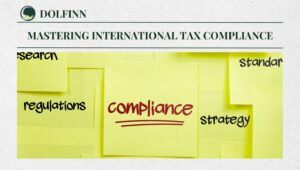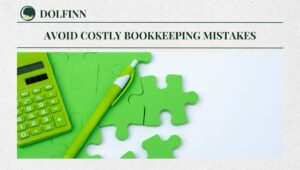
Bookkeeping Mistakes Small Businesses Make and How to Avoid Them
Bookkeeping forms the foundation of a successful small business. Accurate financial records enable better decision-making, tax compliance, and a clear view of your financial health. However, even the most diligent entrepreneurs can stumble into common bookkeeping pitfalls, leading to financial disarray and missed opportunities.
Small businesses, especially those in their early stages, often operate with limited resources and multitasking owners. This makes them particularly vulnerable to errors in record-keeping, which can snowball into significant problems over time. By understanding these challenges and implementing practical solutions, you can safeguard your business’s financial stability.
In this blog, we’ll uncover five frequent bookkeeping mistakes small businesses make and share practical tips to sidestep these errors. Whether you’re just starting out or looking to refine your process, these insights will keep your finances on the right track.
1. Mixing Personal and Business Finances
Why It Happens:
The convenience of using one account for both personal and business transactions is tempting, especially when starting a new venture. Many small business owners underestimate the complications this can cause, thinking they’ll “sort it out later.”
Consequences:
- Confusion in cash flow tracking: Mixing accounts blurs the line between personal and business funds, making it difficult to track expenses or calculate profits accurately.
- Difficulty separating expenses during tax filing: If personal and business transactions are intertwined, identifying deductible expenses becomes tedious.
- Risk of losing liability protection: For LLCs or corporations, blending finances could result in “piercing the corporate veil,” exposing personal assets to business liabilities.
How to Avoid It:
- Open a separate business bank account and credit card: This ensures all business transactions are isolated, simplifying bookkeeping and tax filing.
- Use accounting software to categorize expenses: Tools like QuickBooks or Xero can automate expense tracking and provide clear financial insights.
- Draw clear boundaries: If you must use personal funds for a business expense, record it as an owner’s contribution to maintain accurate records.
Example: Imagine you purchase supplies for your business using your personal credit card. By categorizing this transaction as a business expense in your accounting software, you’ll maintain clarity and avoid missing a deduction.
2. Delaying Bookkeeping Tasks
Why It Happens:
When juggling multiple responsibilities, bookkeeping can often fall to the bottom of the priority list. Entrepreneurs frequently tell themselves, “I’ll do it later,” only to find themselves overwhelmed with months of backlogged entries.
Consequences:
- Missed deductions and financial discrepancies: Delayed entries lead to forgotten transactions and missed opportunities for tax savings.
- Chaotic tax season: Incomplete records create last-minute stress during tax filing, increasing the risk of errors or penalties.
- Increased chances of errors: Postponing bookkeeping can result in forgotten details, mismatched numbers, and incorrect reports.
How to Avoid It:
- Set a schedule: Dedicate specific time weekly or monthly to update your books. Consistency is key.
- Leverage automation: Use tools like QuickBooks or Xero to sync bank transactions automatically, reducing manual work.
- Outsource bookkeeping: If time constraints persist, hiring a professional bookkeeper can save you stress and ensure accuracy.
Example: A bakery owner who updates their books every Friday evening avoids the last-minute scramble at tax time, ensuring no expense or income goes unrecorded.
3. Poor Expense Tracking
Why It Happens:
Failing to log expenses in real-time or losing receipts creates gaps in financial records. This often happens when business owners rely on memory or physical receipts, which are easily misplaced.
Consequences:
- Missed tax deductions: Without proper records, you may overlook deductible expenses, resulting in higher tax liabilities.
- Incomplete cash flow understanding: Missing expense data skews your financial statements, making it difficult to assess profitability.
- Budgeting challenges: Inaccurate expense tracking can lead to overspending or underestimating costs, affecting financial planning.
How to Avoid It:
- Digitize receipts: Use apps like Expensify, Wave, or even your phone’s camera to capture and store receipts immediately.
- Adopt real-time tracking: Record expenses as they occur, either manually or through software with expense tracking features.
- Establish a process: Create a simple system for categorizing and storing expense records to ensure consistency.
Example: A consultant using an expense-tracking app can easily capture and categorize travel, lodging, and meal costs during business trips, ensuring no deductions are missed.
4. Misclassifying Transactions
Why It Happens:
Lack of accounting knowledge or neglecting to set up clear categories in your bookkeeping system can lead to incorrect categorization of income and expenses. For instance, recording a loan as income or categorizing a capital expense as an operational one.
Consequences:
- Inaccurate financial statements: Misclassified transactions distort your profit and loss statement and balance sheet.
- Incorrect tax filings: Misclassifications can result in overpaid or underpaid taxes, risking penalties.
- Misleading insights: Faulty reports hinder data-driven decisions, as they don’t accurately reflect your business’s performance.
How to Avoid It:
- Use accounting software: Platforms like Xero and QuickBooks offer predefined categories that align with tax regulations.
- Review regularly: Periodically audit your classifications to identify and correct errors.
- Consult professionals: An accountant or bookkeeper can help set up your chart of accounts and provide guidance on proper classification.
Example: A retailer who correctly categorizes inventory purchases under “Cost of Goods Sold” avoids inflating operational expenses and gains a clear understanding of gross profit margins.
5. Overlooking Financial Reports
Why It Happens:
Entrepreneurs often focus on daily operations, neglecting regular reviews of financial reports. Some may feel intimidated by the numbers or believe they don’t have the time for detailed analysis.
Consequences:
- Limited understanding of performance: Without reports, it’s difficult to identify areas of strength or weakness.
- Missed growth opportunities: Trends and insights that could guide strategic decisions go unnoticed.
- Higher financial risk: Ignoring reports increases the likelihood of cash flow problems or overspending.
How to Avoid It:
- Commit to monthly reviews: Make it a habit to review key reports like profit and loss statements, balance sheets, and cash flow statements.
- Leverage dashboards: Many accounting tools offer visual dashboards for quick insights.
- Collaborate with an accountant: Regular consultations with an accountant can help you interpret metrics and implement strategies for improvement.
Example: A café owner who reviews their monthly sales report notices a seasonal dip in revenue and plans a promotional campaign to boost sales during slower months.
Conclusion
Avoiding these common bookkeeping mistakes can significantly enhance your business’s financial health. From separating personal and business finances to leveraging technology for accurate tracking and reporting, proactive steps can save time, reduce stress, and improve financial clarity.
Successful bookkeeping isn’t about perfection; it’s about consistency and effort. Adopting best practices, such as using accounting software and seeking professional advice, ensures you’re on the right track. Moreover, staying organized and proactive empowers you to focus on what truly matters: growing your business.
Remember, clean books are the backbone of any thriving small business. Whether it’s tackling tax season with ease or understanding your financial position at a glance, prioritizing bookkeeping is an investment in your success.
FAQs
1. Why is bookkeeping essential for small businesses?
Accurate bookkeeping ensures compliance with tax laws, offers valuable insights into your financial health, and simplifies decision-making. It also provides the foundation for securing loans or attracting investors.
2. How often should I update my bookkeeping records?
Ideally, update records daily or weekly. At a minimum, review and reconcile them monthly to ensure accuracy and completeness.
3. Should I hire a professional for bookkeeping?
While tools like QuickBooks make it possible to manage bookkeeping independently, hiring a professional can ensure accuracy, save time, and provide expert insights, especially for complex financial situations.
4. What tools are best for small business bookkeeping?
Popular options include QuickBooks, Xero, Wave, and Expensify. These platforms simplify expense tracking, invoicing, and reporting, making it easier to maintain accurate records.
5. What if I’ve already made bookkeeping mistakes?
Identify and correct errors promptly. Consult a professional bookkeeper or accountant to reorganize your records and establish best practices moving forward. Remember, it’s never too late to improve your processes.
6. How can I make bookkeeping less time-consuming?
Automate tasks using accounting software, set reminders for regular updates, and consider outsourcing repetitive tasks. Streamlining processes can make bookkeeping more manageable and less overwhelming.
Summary
Accurate bookkeeping is crucial for small businesses, yet common mistakes often cause financial chaos. From mixing personal and business finances to overlooking important financial reports, these errors can lead to missed opportunities and costly tax issues. In this blog, we reveal the top 5 bookkeeping mistakes small businesses make and provide practical tips on how…
Latest Posts
- Top Cash Flow Forecasting Tools You Can’t Ignore for Global Businesses

- Mastering Profit vs. Cash Flow: 5 Key Strategies for Financial Success

- 5 Key Advantages and Disadvantages of Outsourced Accounting: Is Outsourced Accounting Worth the Risk?

- Mastering Cash Flow Management in 2025: 7 Proven Strategies for Financial Success

- Mastering International Tax Compliance: 7 Crucial Strategies for Multinational Success

- 5 Common Bookkeeping Mistakes Small Businesses Make and How to Avoid Them

